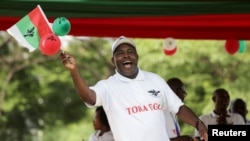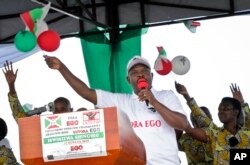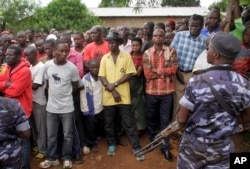Thursday's controversial referendum could extend the president's term in office to seven years and allow him to run for two consecutive terms. In a worst case scenario, rights groups fear the referendum could spark a new Burundian civil war.
Politicians have had their chance to argue the case for and against changing the constitution, but their debate has focused on the political system. Bujumbura residents say the proposed changes do not address their day-to-day problems.
Bujumbura was quiet and peaceful Wednesday. But behind the bustling streets and smiling faces lie fear and uncertainty.
For the most part, ordinary Burundians have been reluctant to talk about the referendum in public for fear of reprisals. One of the few willing to speak, Victor Kabera, a tailor, said he just wants a safe place to live and work.
He said the referendum vote is not important to him. Even if it takes two to three years, politicians can still go ahead and do it. But he said what the people are crying for is safety and security.
The most controversial amendment would extend the president's term from five years to seven, and effectively allow President Pierre Nkurunziza to run for two additional terms.
Nkurunziza has led the Central African country since 2005. His decision to run for a third term in 2015 led to violence and unrest that prompted 400,000 Burundians to flee the country.
The ruling party CNDD FDD said the changes would bring stability to the country's political system. Critics say they would simply strengthen Nkurunziza's hold on power.
Leonard, a university graduate who only gave his first name, told VOA he does not see why he should vote. He said he will go because it is his right, but he does not know what will happen. Something bad may happen, he added, and he does not see how this constitutional change is going to benefit him as an ordinary person.
Divine Irakoze, who lives in a Bujumbura neighborhood that has seen much violence is the past three years, said the changes should have been on how to improve security, build peace and the economy.
She said changes and development will lead to an end to ongoing killings and disappearances. And if killings and disappearances end, she said people will be free to speak and build a democratic society.
Rights groups say killings, intimidation, and attacks on civilians have become a common occurrence in Burundi. In a worst case scenario, they fear the referendum could spark a new Burundian civil war.













